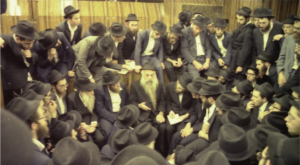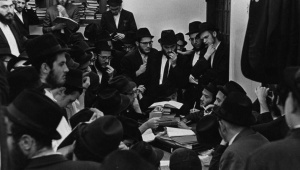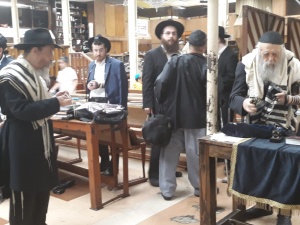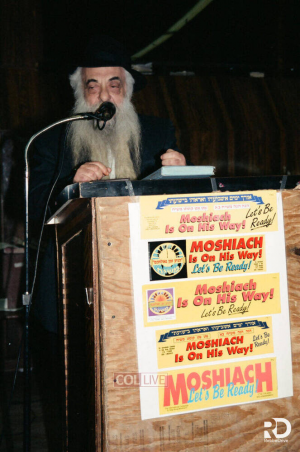Yoel Kahan
Rabbi Yoel Kahan (pronounced Kahn, 16th of Shevat 5690 - 6th of Menachem Av 5781) served as the chief chozzer (oral transcriber) of the Rebbe and was a mashpia (spiritual mentor) at the Central Tomchei Temimim Yeshiva for many years. He became known as one of Chabad's most prominent mashpiim, both due to his role as the chozzer and his unique talents, which included a phenomenal memory, deep understanding, and gift for explanation. Rabbi Kahn was a sought-after lecturer for Chassidic discourses and farbrengens, especially among Polish Chassidim. His lectures were collected, edited and published in various books.
Early Life[edit | edit source]
R' Yoel was born on 16 Shevat 5690 (1930) in Moscow, to his father Rabbi Raphael Nachman Cohen. In 5695 (1935), his family left Russia and traveled through Poland on their way to the land of Israel to live in Ramat Gan. In Poland, they merited to have a private audience (yechidus) with the Previous Rebbe. According to the story, when they left the yechidus, the Rebbe spoke with young Yoel and asked him: "What's the difference between this Rebbe and your Rebbe in cheder?" Young Yoel answered: "This is the Rebbe of all Rebbes." The Rebbe enjoyed this answer and told his father: "You have a special child, take care of your son."
When they were on their way to the ship, the Previous Rebbe sent young Yoel, who had given him such pleasure, a bar of chocolate. His mother, concerned about jealousy among the children, divided the chocolate among all the children.
He immigrated to the land of Israel on the first day of Adar I 5695 (1935). In his youth, he lived in the Chassidic communities that developed in the Holy Land, in Tel Aviv and Ramat Gan.
Starting from 5698 (1938), he studied at Yeshivas Achei Temimim in Tel Aviv under the mashpia R' Chaim Shaul Brook, R' Shlomo Chaim Kesselman, and also absorbed his education from the enlightened chassid R' Moshe Gurary and from R' Nachum Goldschmidt, R' Meir Blizinsky, and other elder chassidim.
Unlike many members of the Anash community who went to study at Ponevezh Yeshiva, R' Yoel refused to entertain such a proposal. Even when his friends Rabbi Baruch Dov Povarsky and Rabbi Shlomo Berman transferred from Achei Temimim to Ponevezh, he refused to even consider studying at a non-Chabad yeshiva.
R' Yoel requested several times from the Rebbe Rayatz to come study at 770, but the Rebbe refused. A short time before 10 Shevat 5710 (1950), the Rebbe approved his trip, and he immediately arranged the paperwork and prepared for the journey.
On 11 Shevat 5710 (1950), he traveled to study at the central Yeshivas Tomchei Temimim - 770. When he boarded the ship, he was not yet aware of the passing of the Rebbe Rayatz. On the way to the United States, he learned of the passing of the Rebbe Rayatz, and stayed - following instructions he received from the Rebbe, and became connected to the Rebbe.
On 15 Elul 5714 (1954), he married Mrs. Luba Leah, daughter of R' Shneur Zalman Butman. As was customary at that time, the person who officiated the marriage ceremony (mesader kiddushin) at the wedding was the Rebbe.
His Torah Activity's[edit | edit source]
As a Chozzer[edit | edit source]
Immediately upon arriving at 770, his exceptional talents became apparent, and he began writing hanacha (transcripts) of the Rebbe's sichos (talks). The elder Chassidim who had been chozzrim for the Rebbe Rashab were impressed by his special ability in both understanding and phenomenal memory. The Rebbe instructed him to be his chief chozzer and from then on viewed him as primarily responsible for all transcripts and publications of his teachings.

Rabbi Yoel served as the Rebbe's chozzer from the beginning of the Rebbe's leadership. A few days after the Rebbe accepted the leadership, at the farbrengen of 11 Shevat 5711, the Rebbe turned to him and requested him to prepare a hanacha of the maamar "Basi LeGani" that was said at the farbrengen. It is also known that on Shavuos 5712 in the early morning, the Rebbe held a farbrengen and waited to say the maamar until Rabbi Yoel returned from the mikvah.
Committee for Spreading Chassidus[edit | edit source]
In 5711, Rabbi Yoel joined and revitalized the Committee for Spreading Chassidus that was founded about ten years earlier in 5701, to print the Rebbe's sichos and spread Chassidus in various circles. Rabbi Yoel edited the printed material and radio lectures, during which the Rebbe edited many sichos.
Likkutei Sichos[edit | edit source]
As chozzer, Rabbi Yoel wrote and prepared many sichos for editing, from which volumes 1-4 of Likkutei Sichos were later printed. After seeing that the Rebbe agreed to edit the sichos but required comprehensive editing before submission for editing, Rabbi Yoel dedicated himself to re-editing the sichos, which initially focused mainly on Rashi's commentary, which the Rebbe began delivering after his mother Rebbetzin Chana's passing, from which Likkutei Sichos volumes 5-9 were printed.
Sefer HaErechim[edit | edit source]
At the beginning of the Rebbe's leadership, the Rebbe instructed Rabbi Yoel to begin writing a comprehensive encyclopedia of Chabad Chassidic teachings. He began the writing together with Rabbi Chaim Shalom Dovber Lipsker, who later withdrew from the work. In response to Rabbi Shlomo Yosef Zevin's comment about excessive length where each topic is divided into details, particulars of details, and particulars of particulars until the reader loses the connecting thread and sometimes it seems like a maze, the Rebbe responded: "Of course, he is correct in his comment regarding the details, etc. in the Chabad Encyclopedia, and I have alerted the editors about this several times (and I will continue to do so) – and for now it has helped somewhat. It is difficult to restrain the enthusiasm in Chassidus, it is 'also' difficult for the one who limits it."

Between the years 5743-5745 (1983-1985), the Rebbe spoke at a Shabbos Lech Lecha farbrengen about how Rabbi Yoel (without mentioning his name) was not focusing on writing the Sefer HaArachim [Encyclopedia]. When some tried to use these words to summon him to a Din Torah and published this accusation against him, the Rebbe wrote a special response detailing his praise on one hand while rejecting the reasons cited for the claim:
"With the greatest astonishment I read the above and what was enclosed with the conclusion 'and peace upon Israel' - that after deliberation for a long time and investigation (at least seemingly) the main point is missing. And you force me (and also - to put in writing) expressions that I am not accustomed to at all. In any case, I will be as brief as possible, with the introduction, although it is obvious: This is not about [people who] 'sit at street corners' but rather exactly the opposite: a claim to Beis Din regarding a specific person, and this person educates in matters of the living G-d hundreds of people (including in Tomchei Tmimim) for decades, etc. And briefly, the content of the claim: I commanded the above at a farbrengen in public: 1) that he should not engage in anything else, etc., 2) that his only matter is one thing, etc. 3) and the above person publicly did exactly the opposite in the Beis Midrash - praying, etc. - and therefore his description (and consequently his judgment) is such and such. Since I never commanded him (and also did not request similar to this) the above in public (and not in private either), it is well-known that with my encouragement he engages in many things for decades (and certainly the members of the Beis Din also know this), the claim to the Beis Din and the accusations against the above person - were publicized to many more than 3 people. And their response to all this (together with the content enclosed here) is as mentioned above! And to note - I also did not command others similarly (and also did not request) - because this is against human nature in which a person was created (to engage only in one thing) - and according to what is explained in Chassidus, this is contrary to his virtue (Likkutei Torah Emor - 37b. And in many places). Another matter - the main claim is that the one approaching the Beis Din and accusing, etc. - himself did not hear even one word of all that he writes in my name. Rather, he heard fleeting letters and then searched in notes, etc. And seemingly the first question of the Beis Din to him should have been: what did he hear, etc. - and this is the main cause of all the above. And if the claim is true - why did he hide such a fundamental matter, etc."
As Mashpia and Educator[edit | edit source]
Shortly after his arrival at 770, he was appointed as a teacher of Chassidus, initially at the yeshiva in Bedford and Dean and afterwards at the yeshiva at 770. At the beginning of the year 5714 (1953-1954), they arranged a new Chassidus class in the yeshiva and looked for a Chassidus supervisor. Several suggestions were proposed to the Rebbe, and the Rebbe asked: "Why not Yoel? He would be suitable for this." In his holy response from 7 Adar 5747 (1987), the Rebbe wrote about him: "This is not about 'those who sit at street corners' but rather exactly the opposite... and this person educates in Chassidus (including in Tomchei Tmimim) for decades, etc."

Rabbi Yoel served as the head mashpia in the central Tomchei Tmimim Yeshiva - 770, gave classes in 770 and farbrenged with the Kvutza students, and also participated in some of the administration meetings and would occasionally express his opinion on matters of yeshiva management. In the many farbrengens among Chabad Chassidim (and especially among the students), he would mainly emphasize the need for hiskashrus (connection) to the Rebbe.
For many years, he gave classes in Monsey and Lakewood, through which thousands became closer to Chabad Chassidus. As part of this, he gave a weekly class at the Chabad synagogue "Beis Menachem" on 16th Avenue in Boro Park. Occasionally, he would go on journeys to spread Chassidus in the United States, Europe, and the Holy Land, during which he gave many Chassidus classes to audiences of Polish Chassidim.
Among his distinguished students are the cream of Chabad mashpiim and rabbis, including: Rabbi Shlomo Zarchi, Rabbi Leibel Shapiro, Rabbi Nachman Shapiro, Rabbi Mendel Vechter, Rabbi Elimelech Zweibel, and others.
His Activity's[edit | edit source]
His Meeting With The Gedolei HaDor[edit | edit source]
In the 5720s and 5730s (1960s-1970s) during his annual trips to the Holy Land, Rabbi Yoel met with Torah giants and Admorim in both the Litvish and Chassidic Charedi communities.
The journey was undertaken on the advice of several Chabad activists, in consultation with the Chabad Rabbinical Court in the Holy Land, so that these meetings would bring closeness between the communities and courts, which would assist in spreading Chassidus.

Among others, he met with the Admor of Ger, the Admor of Belz, Rabbi Chaim Kanievsky (Rabbi Avraham Menachem Mendel Vechter also participated in this meeting), Rabbi Aharon Yehuda Leib Steinman, with the heads of Ponevezh Yeshiva Rabbi Baruch Dov Povarsky [source needed], Rabbi Chaim-Peretz Berman (Rabbi Povarsky's son-in-law and a Rosh Mesivta in Ponevezh Yeshiva), and others [source needed].
His visits received extensive coverage in the Charedi press in the Holy Land.
Musical Talent[edit | edit source]
R' Yoel was known as an exceptional and precise musician. He received the niggunim (melodies) from his father and from the elder Chabad chassidim when he studied in Eretz Hakodesh, as well as from the elder chassidim at 770. During the niggunim sessions on Friday nights in the small zal at 770, and also during Shabbat meals in his home, he would frequently sing and be precise with the niggunim, and sometimes he would even teach lesser-known niggunim.
In many farbrengens (chassidic gatherings), the Rebbe would instruct him to begin the niggunim and would signal him in various ways regarding the niggunim, such as how many times to sing the last movement of the Daled Bavot and the like.
In the 1950s (5710s), the Rebbe complained that there was no order to the niggunim at farbrengens, so he appointed a Vaad Hamengenim (committee of musicians) headed by R' Tzvi Hirsch Gansburg (Hershke), who began the niggunim at farbrengens, because R' Yoel was busy summarizing the sichos (talks) during the singing. But from the Rebbe's perspective, R' Yoel was the one responsible, and only once when R' Yoel mistakenly began the wrong niggun, not what the Rebbe had instructed, and R' Tzvi began the correct niggun, did the Rebbe signal surprise to R' Yoel and approve R' Tzvi's niggun.
At the Purim farbrengen of 5739 (1979), the Tehran children sang a niggun to the liturgical poem "Yigdal Elokim Chai." During their singing, the Rebbe asked R' Yoel if he had captured the niggun, saying: "They say about you that you have the ability to capture a niggun."
Chassidic Stories and Teaching[edit | edit source]
Rabbi Yoel was a transmitter of tradition and Chassidic stories, many of which he received from his father, Rabbi Refael Nachman Kahn, who authored "Shmuos V'Sippurim," and from other elder Chassidim. Rabbi Yoel was extremely precise in the details of the stories and would tell them at farbrengens and at his Shabbos night meals with bochurim.
Views on Moshiach[edit | edit source]
In 5751, following the Rebbe's encouragement of activities to accept his kingship as Melech HaMoshiach, he wrote an article explaining the Chassidim's belief that the Rebbe is Melech HaMoshiach. He based his arguments on halachic proof that Moshiach must be specifically a human being, flesh and blood. He even claimed in the article that not only is there no prohibition for a Chassid to say his Rebbe is Moshiach, but one who truly believes his Rebbe is the greatest of the generation and believes in Moshiach should naturally believe that Moshiach will be his Rebbe.

In 5753, he served as a member of the World Headquarters for Bringing Moshiach. During this period, he passionately engaged in publicizing Moshiach's identity, redemption, and "Yechi Adoneinu," through farbrengens, shiurim, lectures, and interviews for Kfar Chabad magazine. In these, he expressed his clear opinion about the certainty of the Rebbe's complete revelation as Melech HaMoshiach in our generation and the eternality of his physical life.

After 3 Tammuz 5754, he modified his views and declared that one should not engage in publicizing Moshiach's identity. Although there is no doubt that the Rebbe is Moshiach - because from an inner perspective, the Rebbe's teachings and work are an expression of Moshiach's soul's revelation (and not just "worthy to be Moshiach"), he argued that one should not conduct publicity about this outside of Chabad.
Final Years[edit | edit source]
With the purchase of Rabbi Meir Itkin's private home adjacent to 770 and its transfer to the ownership of the Lubavitch Library, a room was renovated for him on the first floor where he worked diligently. Later, he also moved to live on the first floor of the house.
In his final year, his medical condition experienced ups and downs. In 5780, with the outbreak of the COVID-19 pandemic in Crown Heights, he too contracted the virus but recovered after a short period. In his final months, he was hospitalized several times at the Manhattan hospital until Thursday, 6th of Menachem Av 5781, when he returned his soul to his Creator and was buried the next day in Montefiore Cemetery near the Previous Rebbe's Ohel.
His Books[edit | edit source]
- Sefer Ha'arachim - Chabad (chief editor) - Encyclopedia of Chassidic teachings, 9 volumes (additional volumes remained in writing) published by Kehot
- Gidran Shel Mitzvot Chukim Umishpatim in the Rebbe's teachings (co-editor with Rabbi David Olidort), 5754 [1994]
- Mahutam Shel Yisrael - According to Chassidic teachings
- Mai Chanukah - The miracle of Chanukah according to Chassidic teachings
- Hamoadim BaChassidut and Sugiyot BaChassidut - 2 volumes. Edited by Rabbi Eliyahu Avraham Kirschenbaum
- Chukim Umishpatim - The essence of mitzvot according to the Rebbe's talks
- Shiurei Chassidut - Geulah - Transcription of Rabbi Yoel's lectures on the topics of redemption, Moshiach, and the Third Beit Hamikdash. Edited by Rabbi Shmuel Chaim Bluming. Published in 5752 [1992]
- Igeret HaTeshuvah - Published by Mayanot. Edited by Rabbi Eliyahu Avraham Kirschenbaum
- Shaar HaYichud VehaEmunah - Explanations from Rabbi Yoel's lectures on Shaar HaYichud VehaEmunah in Tanya. Edited by Rabbi Eliyahu Avraham Kirschenbaum
- Maaneh Chacham - Addressing the claims of the Satmar Rebbe in his book 'Al HaGeulah V'al HaTemurah' about the Rebbe's views on Zionism and regarding the Ten Mivtzoyim
- Likutei Amarim with Biur HaShaveh L'chol Nefesh - Commentary on Tanya, published by HaMaor ShebaTorah, 5763 [2003]
- Machshevet HaChassidut - Two volumes, collection of topics in Chassidic teachings and perspective, compiled from Rabbi Yoel Cohen's lectures by Rabbis Menachem Mendel Brod and Moshe Marinovsky for a column by this name in the Kfar Chabad weekly. The book was published in 5765 [2005] by Rabbi Menachem Mendel Kaplan. A new revised edition on "Torah and Mitzvot" in 5782 [2022] published by Mayanosecha and newly edited by Rabbi Brod, including the pamphlet "Gidran Shel Mitzvot Chukim Umishpatim."
- B'Darchei HaChassidim - Chapters of farbrengens, stories, and lectures, edited by his students. Volume 1 - 5775 [2015]. New edition with additions, Yachad Publishing and Mayanosecha Library, 5782 [2022]. Volume 2 - 5782 [2022]. Edited by Rabbi Eliyahu Avraham Kirschenbaum
- L'havin Ul'haskil. Explanation of four maamarim of the Rebbe, published by Mayanosecha 5776 [2016]. Edited by Rabbi Eliyahu Avraham Kirschenbaum
- Shiurim B'Kuntres Inyana Shel Torat HaChassidut - Published by Mayanosecha 5778 [2018], edited by Rabbi Eliyahu Avraham Kirschenbaum and Rabbi Meir Shlomo Kaplan
- Pirurim MiShulchano Shel R' Yoel - Collection of pearls from things said in farbrengens he held with bochurim who dined at his table on Friday nights - Elul 5780 [2020], edited by Rabbi Avraham Goldschmid
- Chinuch Chabadi Mahu?, published by Igud HaMelamdim, Sivan 5783 [2023]
- MiShulchano Shel R' Yoel - Published by Yachad 5782 [2022], compilation from the books "B'Darchei HaChassidim"
- Kulo Orah - Published by Mayanosecha 5783 [2023], collection of talks given by Rabbi Yoel and edited by Rabbi Menachem Mendel Feldman for Ki Karov journals
After his passing
After his passing, a halachic controversy arose regarding printing his books, whether it is permissible to print materials that were edited based on lectures and farbrengens he gave publicly, even though he expressed his explicit wish against this, with the Chabad Rabbinical Court and other prominent poskim leaning toward prohibiting this, and allowing the printing of his books only by his students who were authorized by him for this purpose.
- He'emanti Ki Adaber (Second Edition) - Collection of speeches, farbrengens, and interviews he said and wrote during the years 5751-5754 [1991-1994], these speeches are permeated with passion about Moshiach and the Rebbe as Melech HaMoshiach. Kislev 5781 [2020], published by Machon 'Chutzah'.
- Shamanu MeR' Yoel - Published by Chazak, 5781 [2021] one month after his passing
Further Reading[edit | edit source]
- A Different Perspective, A Different Understanding, A Different Hope - Comprehensive Interview with R' Yoel, "Techayeinu" Issue No. 3, 10 Shevat 5776 (2016)
- R' Yoel Created New People, Kfar Chabad Weekly 1920 page 29
- Rosh Yeshiva of Chassidic Teaching - Yitzchak Kaplan profile in 'Or V'Chayut' journal, Elul 5781 (2021)
- Chozrim Tell Stories - (Mendy Kortes) Kfar Chabad Weekly 1918 page 44
- Every Word of His Cried Out 'There is Nothing Besides Him', Shalom Magidman, Kfar Chabad Weekly Issue No. 1970 pages 49-57 ** • ** To Be a Chassid, Yisrael Shochat pp. 60-65 ** • ** The Chozer and the Professor, Rabbi Shalom Magidman, pp. 66-70
- Or Chozer - Selected thought essays he delivered. Special supplement following his passing
External Links[edit | edit source]
Chazaros
- PODCAST - Recordings from R' Yoel Kahn's 'chazaros' of the Rebbe's farbrengens and talks
Shiurim
- Shiurim and farbrengens of Rabbi Yoel Kahn, on "Chassidut Net" website
- Shiurim and farbrengens of Rabbi Yoel Kahn, on Heichal Menachem website
- Shiurim, on Otzar HaChassidut website
From His Writings and Publications
- Crumbs from R' Yoel's Table, 5780 (2020)
- The Chozer's Diary: First Part • Second Part, Third Part Rebbi Drive system
- Correspondence and Documents from the Early Years of Rabbi R' Yoel Kahn
- New Light: Zealotry in Torah Perspective - Satmar and Lubavitch
Interviews, Lectures and Speeches
- When R' Yoel's Stirring Speech on Religious Coercion was Broadcast on the Corporation • Watch
- Rabbi Yoel Kahn at the 16 Shevat 5753 Gathering: Encouragement of Yechi Means Revelation
- Rabbi Yoel Kahn: They're Turning Lubavitch into a Museum! on website
- Interview with Rabbi Kahn, Kfar Chabad Weekly Issue 558, Shevat 5753 - Excerpts from the interview
- Recording from R' Yoel Kahn's farbrengen - (Link inactive, 25 Shevat 5785)
- "Moshiach is Already Here, and the Revelation Has Already Occurred" - Rabbi Kahn's speech at the traditional thanksgiving meal - 1 Kislev 5754
- The Downfall of the Modern Haman • The Guest Crossed the Date Line - Rabbi Kahn interviewed for JEM's 'My Encounter' program
- Don't Miss: The 'Chozer's' Speech - We Don't Understand but 'Believe'.. ● Hebrew - on website 25 Tishrei 5776
After his passing:
- Mourning in Chabad: The 'Chozer' Mashpia Rabbi Yoel Kahn - News of his passing on website
- Pictures from his life
- The Word of Chabad Which Came to Yoel, HaMevaser Torani Parshat Va'etchanan page 20 onward
- In the New York Times: Major Article Reviews the Rare Character of the Chozer
- Torah Don Sackcloth: Extensive Article in 'HaMevaser' about the 'Chozer'
- ZOOM Farbrengen in his Memory
Miscellaneous
- The Rebbe's Approval to Publish the 'Chozer's' Article on the Identity of Moshiach
- When the Chozer Rabbi Yoel Kahn Stopped the Bochurim: "Don't Mix Niggunim"
Response to Things He Published on the Topic of Moshiach
- Faith of a Simple Jew Speech by Rabbi Chaim Levi Yitzchak Ginzburg, Mashpia of Central Tomchei Temimim Yeshiva on 10 Shevat 5767 at a gathering organized by the Association for the Redemption
- Fiery Speech by Rabbi Axelrod: The Rebbe is Melech HaMoshiach! Protest speech by Rabbi Gedaliah Axelrod, Av Beit Din of Haifa, at the 10 Shevat gathering organized by the Association for the True and Complete Redemption
- The Rebbe is the One Who Created Faith in Moshiach, and No One Else! Rabbi Chaim Ashkenazi, Rabbi of the Chabad community of Tel Aviv
